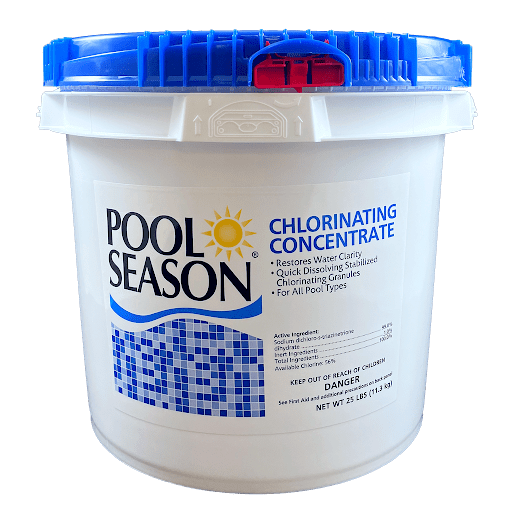Picking Your Pool: Salt Water vs Chlorine - What's Right for You?

Homeowners—whether you're a pool pro or just dipping your toes in—often wonder, "Should I go for a saltwater pool or a chlorine pool?" Spoiler alert: there’s no one-size-fits-all answer! Each type has its charm and offers fantastic swimming experiences, but they do have some key differences.
Saltwater pools use a generator to convert salt into chlorine, giving you a swim that's as refreshing as the ocean—minus the seaweed and excess salt! With only one-tenth the saltiness of ocean water, you’ll enjoy that rejuvenating feel without the briny bite.
Chlorine pools rely on adding chlorine directly to keep things clean and sanitized. This tried-and-true method has been making waves for decades! Do you know that nostalgic pool smell? Yep, that’s chlorine bringing back summer memories of splashes and dives.
Whether you’re drawn to the gentle embrace of salt water or the classic freshness of chlorine, both options can keep your pool sparkling clean. Stick around as we explore how these systems work, weigh their pros and cons, and help you choose the perfect fit for your backyard oasis. Let’s dive into the world of pool maintenance together and make sure your pool is the ultimate retreat for family and friends!
If you’ve ever splashed around in different pools, you know they can feel like two entirely different worlds! What is the secret sauce behind this difference? It all boils down to how these pools are sanitized—either by saltwater or chlorine. So, let’s take a plunge and explore what makes these two systems tick!
Chlorine Pools: The Classic Choice
In a traditional chlorine pool, the sanitization process is a bit more hands-on. Chlorine is added manually in various forms—tablets, liquid, or granular shock. These chlorine products often come with stabilizers to protect them from the sun’s UV rays, which can zap their effectiveness faster than you can say “swim!”
To keep things crystal clear, chlorine pools need regular shock treatments. This means dumping in a hefty dose of granular chlorine to supercharge the water and tackle any stubborn organic nasties that the regular levels just can’t handle. It’s like giving your pool a power-up!


Saltwater Pools: The Gentle Giant
Now, let’s talk about the magic of saltwater pools! These beauties use a nifty process called electrolysis to create the necessary chlorine right on the spot. You simply add salt to the water, and with the help of a chlorine generator (or salt cell), those salt molecules break down to produce hypochlorous acid and sodium hypochlorite—the dynamic duo that keeps your pool sparkling clean.
But here’s where it gets really exciting: swimming in a saltwater pool feels like a dream! Remember that blissful feeling you get after a dip in the ocean? That’s exactly what you experience here! With lower chlorine concentrations, saltwater pools are kinder to your skin and eyes, leaving you feeling refreshed rather than irritated.
And just to clear up any confusion—despite being marketed as “chlorine-free,” saltwater pools do contain chlorine. The difference? They generate it continuously in smaller doses, meaning less hassle for you!
The Showdown: Saltwater vs. Chlorine Pools
So, what’s the scoop? The main differences between these two types of pools lie in their sanitation methods, swimming experiences, and maintenance needs. Each has its unique perks that could help you decide which one is your perfect match.
Choosing between a saltwater pool and a chlorine pool is no small feat—it’s a decision that involves both financial commitment and lifestyle considerations. Here’s what you need to keep in mind:
1. Initial and Ongoing Costs
While setting up a saltwater system may cost more upfront due to the need for a generator, it often proves more economical in the long run. When you factor in the ongoing costs of purchasing chlorine and shock treatments for traditional pools, you might find that running a salt cell is easier on your wallet.
2. Maintenance Expectations
Saltwater pools require less frequent maintenance but can be more complex due to specialized equipment. In contrast, chlorine pools demand regular monitoring of chlorine levels but are generally simpler—just toss in those tablets or liquid!
3. Health and Comfort
If you or your loved ones have sensitivities or health concerns, saltwater pools might be your best bet! With lower chemical levels, they minimize potential discomforts linked to high chlorine concentrations and are often better for allergy sufferers.
4. Local Climate
Your local weather can sway your decision, too! If you live in an area prone to heavy rainfall, a saltwater pool might not be ideal since rain can dilute the salt content and require constant adjustments.
5. Surrounding Landscape
Consider your outdoor space! Salt can be corrosive; if you have natural stone decking or metal furniture nearby, it could lead to quicker deterioration.
6. Your Lifestyle
If your pool sees frequent use—especially by kids or those with sensitive skin—a saltwater system could be more comfortable due to its lower chlorine levels.
7. Environmental Impact
If eco-friendliness is on your radar, saltwater systems may win out! They utilize a natural process for chlorine production, reducing reliance on chemical additives.
Making Your Splash
Weighing these factors will help guide you toward the best choice for your unique circumstances. Remember, your comfort level, budget, and peace of mind are paramount! Finding that sweet spot among these elements will lead you straight to your dream pool retreat.
Are you thinking about making a splash with a saltwater pool? You're not alone! These pools are gaining popularity, but before you take the plunge, let’s break down the pros and cons so you can make a splash-tastic decision.
Pros of Salt Water Pools
- Swimmer Comfort Galore: Say goodbye to itchy skin and red eyes! Saltwater is gentler on your skin and eyes compared to traditional chlorine pools, making it a fantastic option for those with sensitivities.
- Maintenance Made Easy: With a salt cell that converts salt into chlorine, your pool requires less daily upkeep. This means more time lounging and less time cleaning! Consistency in chlorine levels helps keep your pool balanced without the hassle.
Cons of Salt Water Pools
- Initial Investment Shock: The biggest hurdle? The wallet! Installing a saltwater system can be pricey, mainly due to the salt chlorine generator, which can set you back significantly from the get-go.
- Corrosion Concerns: Salt can be tough on your pool's equipment. If you have metal fixtures or natural stone around your pool, they might not stand the test of time against salty water.
- Repair Costs Can Soar: When things go awry—like a malfunctioning chlorinator—repairs can hit harder than those for traditional pools. Be prepared for potentially higher repair bills if something goes wrong.
If saltwater isn’t your style, let’s dive into the classic chlorine pools. They come with their own set of perks and pitfalls.
Pros of Chlorine Pools
- Setup Simplicity: Chlorine pools are straightforward to set up. Just fill it up, add chlorine, and you're ready to swim! This ease makes them a popular choice for many homeowners.
- Powerful Sanitization: Chlorine is a heavy hitter when it comes to zapping bacteria and algae. Your pool will stay clean and inviting all summer long.
- Control at Your Fingertips: You have complete control over chlorine levels, allowing you to adjust as needed after heavy use or rainstorms.

Cons of Chlorine Pools
- Maintenance Drudgery: Keeping those chlorine levels balanced can feel like a chore. Frequent testing and adjustments are required, especially after rain or heavy use.
- Irritation Alert: Chlorine can be harsh on sensitive skin and eyes—definitely something to consider if you plan on spending hours in the water.
- The Smell Factor: Let’s face it; that strong chlorine smell isn’t everyone’s favorite. Plus, costs can add up over time due to ongoing chemical needs.
Whether you're leaning toward the soothing embrace of a saltwater pool or the classic charm of a chlorine pool, each option has its unique set of advantages and challenges. Weigh these carefully against your lifestyle, preferences, and budget to find the perfect fit for your backyard oasis.
Are you thinking about swapping your traditional chlorine pool for a saltwater system? You’re not alone! More and more homeowners are considering this refreshing change. Let’s break down what you need to know to make the switch.
Yes, You Can Make the Switch!
First things first: converting to a saltwater pool is totally doable! But don’t just toss a bag of salt in and call it a day. There’s a bit more to it than that!
Know Your Pool's Size
Before anything else, measure how much water your pool holds. This is crucial for figuring out how much salt to add. Aim for about 3,000 parts per million (ppm) of salinity. For instance, if your pool is around 100,000 gallons, you’ll need about 500 pounds of pool-grade non-iodized salt. And don’t forget to grab a heavy-duty salt chlorine generator to make it all happen!
Install a Salt Chlorine Generator
The star of the show is the salt chlorine generator. This nifty device uses electrolysis to turn salt into chlorine, keeping your pool sparkling clean. Make sure to hire a pro for installation—getting those electrical connections right is key!
Check Your Pool's Compatibility
Salt can be tough on some materials, so double-check that your pool pump, filter system, and liner are all salt-resistant. You don’t want any surprises down the line!
Budget for the Change
While running a saltwater pool can save you money on chemicals, be prepared for upfront costs. Expect to spend between $500 and $2,500 for the generator and installation.
Keep in Mind: Maintenance Still Matters
Saltwater pools aren’t completely maintenance-free! You’ll still need to keep an eye on the chemistry—think salt levels and pH. Plus, the generator cell might need replacing every 3-7 years, depending on how often you use it.
Dive In with Confidence!
Converting your chlorine pool to a saltwater paradise can lead to easier maintenance and a more enjoyable swimming experience. Just make sure you’re fully informed about the process, costs, and how it will affect your current setup.
When deciding between a saltwater pool and a traditional chlorine pool, it's essential to weigh the benefits and drawbacks of each option. Saltwater pools offer a gentler swimming experience, lower long-term maintenance costs, and reduced skin irritation, making them a popular choice for many homeowners.
Conversely, chlorine pools provide a more budget-friendly initial investment and are easier to maintain for those who prefer a hands-on approach. Ultimately, the best choice hinges on your personal preferences, lifestyle, and budget. Whether you prioritize comfort and reduced upkeep or cost-effectiveness and DIY maintenance, both pool types can deliver enjoyable summer days filled with fun and relaxation.
Caring for your pool has never been easier! Save both time and money on maintenance by signing up for our email newsletter today. Enjoy personalized expert tips and exclusive discounts delivered straight to your inbox. Together, let’s keep your pool sparkling clean!


